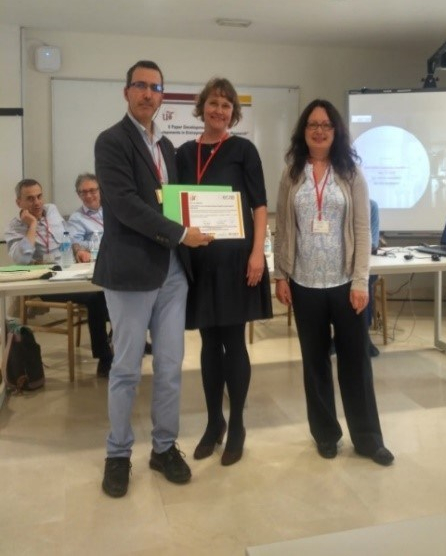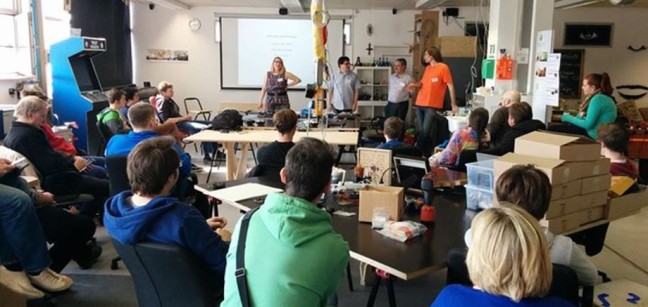In Venture Creation Programs the venture acts as a ‘learning vessel’, enabling what students need to learn – and more. Under guiding support, students need to engage in doing what they are expected to do as practicing entrepreneurs. But if these activities become detached from the rest of the education, as educators we do not know the extent to which students have actually practiced these skills, if they have learned to master them, and if they are aware why they have done them in a certain way. Furthermore, we do not know if the actions are trial and error or if they are using curriculum to become informed about how to do and to reflect upon what they have done and what they need to do next to move the venture forward. Given the venture creation program setting, a key question is: to what extent are our learning objectives regarding entrepreneurial mindsets and skillsets actually fulfilled? How do we ensure that the students are engaging in ‘doing what they need to do’ in order to ‘learn what they need to learn’?
We are educators facilitating learning on a daily basis in two VCPs: Chalmers School of Entrepreneurship and NTNU School of Entrepreneurship. The issue of how to design and assess learning in order to ensure that the students are learning what they need to learn is therefore continuously on our minds and in our discussions. For the Practitioner Development Workshop (PDW) at the 3E 2018 Conference in Enschede we decided to discuss this issue with other entrepreneurship educators. The participants were divided in groups around a two-by-two matrix with mindset and skillset on the x-axis and classroom and venture on the y-axis. Each group started their discussion by recalling and sharing a learning activity. Thereafter, the challenge was to combine this learning activity with activities from the other side of the y-axis (thereby combining theory and practice) and suggest how the assessment should be made for the combined activity. When all groups presented what they had done, the participants described that the matrix had challenged them to think about various possibilities of combining activities compared to their standard practice. The participants confessed that their group discussions had brought to light the particular difficulty of assessing development of mindset as takes place in the venture.
At the VCP-forum the same year, 25 participants from European and North-American VCPs gathered to discuss best practices, better practices and challenges of facilitating learning in VCPs. The participants of the VCP-forum did not find the combination of academic work and venture creation difficult per se and had a clear idea of how it should co-exist in their programs on the structural level. It was the practical aspects of how to facilitate learning in this way that were perceived to be the most challenging. For instance, the program managers recalled being frustrated when students did not seem to be aware of ‘what was good for them’, prioritized the wrong meetings, or simply did not engage in and complete enough academic or practical tasks to see the whole picture. The program managers agreed that it is the documented learning from the venture creation process that should be assessed, and not the results (read: success, or not) of the venture being created. However, there was still no consensus on how to practically capture the learning experience, in part due to the contextual complexity inherent in each environment, compiled by the unique variables of each venture journey.
Thus, ensuring that the students are engaging in ‘doing what they need to do’ in order to ‘learn what they need to learn’ is a multi-faceted problem with many issues that are still unresolved. But we can recognize that these issues depend upon the design and assessment of learning, which helps to focus our attention as educators. Everyone working in a VCP witness the benefits of using academic knowledge when analyzing the situation in a venture while simultaneously using the practical understanding from venture creation when approaching theoretical concepts. We can recognize that when puzzle pieces fall into place, students are able to climb steep learning curves at a remarkable speed. We therefore need to continue to discuss and share experiences between VCPs in order to continue to improve facilitation and assessment of learning processes.
Authors:

Karen Williams Middleton (on right) is Associate Professor in entrepreneurship at Chalmers University of Technology, Sweden and Lise Aaboen (on left) is Professor of technology-based entrepreneurship at Norwegian University of Science and Technology (NTNU), Norway.
We were invited to write this blogpost based on our PDW-award from the 3E 2018 Conference in Enschede, the Netherlands. The second part of the blog post is based on a conference paper that summarized the VCP-forum in Trondheim 2018. If you want to discuss VCPs, do not hesitate to send us an e-mail (karen.williams(a)chalmers.se; lise.aaboen(a)iot.ntnu.no)
Williams Middleton, Karen and Lise Aaboen (2018) “Designing and Assessing Learning in Venture Creation Programs”. PDW at 3E ECSB Entrepreneurship Education Conference, in Enschede, the Netherlands on May 16-18, 2018.
Haneberg, Dag Håkon, Lise Aaboen and Karen Williams Middleton (2019) “An evidence-based research agenda for action-based entrepreneurship education“. Presented at CREE Entrepreneurship Education, rethinking connections: Implications, Opportunities and Changes, in Roanne, France on March 7-8, 2019.

 In 2017, the well-known entrepreneur Elon Musk was asked at a conference in Dubai to offer advice for young people wanting to become like Elon Musk, and replied “I am not sure I want to be me.” Since he was a child, Elon Musk knew who he was and who he wanted to be, as he said about the time when he was in college “I wanted to be involved in things that would change the world.” Nevertheless, gaining the competence and perception to really change the world took him on a rollercoaster ride of highs and lows in his career and personal life. There are many more examples of entrepreneurs with a mission to change the world for the better who have struggled in their early career until they really perceived they had the competence to become a successful entrepreneur. Particularly in the early stages of a venture, it is important that entrepreneurs perceive themselves to be able to adequately address forthcoming entrepreneurial challenges. On the downside, being overconfident as an entrepreneur potentially results in venture failure as such overconfident entrepreneurs set unattainable goals.
In 2017, the well-known entrepreneur Elon Musk was asked at a conference in Dubai to offer advice for young people wanting to become like Elon Musk, and replied “I am not sure I want to be me.” Since he was a child, Elon Musk knew who he was and who he wanted to be, as he said about the time when he was in college “I wanted to be involved in things that would change the world.” Nevertheless, gaining the competence and perception to really change the world took him on a rollercoaster ride of highs and lows in his career and personal life. There are many more examples of entrepreneurs with a mission to change the world for the better who have struggled in their early career until they really perceived they had the competence to become a successful entrepreneur. Particularly in the early stages of a venture, it is important that entrepreneurs perceive themselves to be able to adequately address forthcoming entrepreneurial challenges. On the downside, being overconfident as an entrepreneur potentially results in venture failure as such overconfident entrepreneurs set unattainable goals. What could we do to foster entrepreneurial skills especially among nascent missionary entrepreneurs? Learning about entrepreneurship and gaining experience in entrepreneurship helps different types of entrepreneurs to feel more competent but, as our study shows, does not mitigate differences in perceived competences between entrepreneurs with different social identities. We need nothing less than a change in the classification of certain skills among different types of entrepreneurs. Just as we should teach students of medicine that running a medical practice competently is part of a physician’s DNA, we should also teach nascent missionary entrepreneurs that entrepreneurial skills like managing innovation are the foundation of sustainably applying solutions to societal problems. Furthermore, we now know that nascent missionary entrepreneurs might not feel wholly competent in the skills of entrepreneurship, even when in reality they are. This is why education should help those entrepreneurs to truly experience their entrepreneurial self-efficacy through teaching methods like service-learning, and offering them the experience and positive feedback they need to alter their perceptions of competence. Such a policy could help transcend the frontiers of commercial entrepreneurship and social activism by rewarding individuals who base their social activities on solid entrepreneurial skills and competences. Specifically, more funding and promotion for social entrepreneurship could create an awareness among nascent entrepreneurs that possessing basic entrepreneurial skills and a missionary social identity can serve one and the same end.
What could we do to foster entrepreneurial skills especially among nascent missionary entrepreneurs? Learning about entrepreneurship and gaining experience in entrepreneurship helps different types of entrepreneurs to feel more competent but, as our study shows, does not mitigate differences in perceived competences between entrepreneurs with different social identities. We need nothing less than a change in the classification of certain skills among different types of entrepreneurs. Just as we should teach students of medicine that running a medical practice competently is part of a physician’s DNA, we should also teach nascent missionary entrepreneurs that entrepreneurial skills like managing innovation are the foundation of sustainably applying solutions to societal problems. Furthermore, we now know that nascent missionary entrepreneurs might not feel wholly competent in the skills of entrepreneurship, even when in reality they are. This is why education should help those entrepreneurs to truly experience their entrepreneurial self-efficacy through teaching methods like service-learning, and offering them the experience and positive feedback they need to alter their perceptions of competence. Such a policy could help transcend the frontiers of commercial entrepreneurship and social activism by rewarding individuals who base their social activities on solid entrepreneurial skills and competences. Specifically, more funding and promotion for social entrepreneurship could create an awareness among nascent entrepreneurs that possessing basic entrepreneurial skills and a missionary social identity can serve one and the same end. Leif Brändle is a PhD candidate at the Entrepreneurship Research Group, University of Hohenheim, Stuttgart, Germany. He is facilitator of the Startup Garage Hohenheim and part of the organizing team of the Social Innovation Summit in Zurich/Stuttgart, the largest conference on social innovation and social entrepreneurship in the German-speaking countries.
Leif Brändle is a PhD candidate at the Entrepreneurship Research Group, University of Hohenheim, Stuttgart, Germany. He is facilitator of the Startup Garage Hohenheim and part of the organizing team of the Social Innovation Summit in Zurich/Stuttgart, the largest conference on social innovation and social entrepreneurship in the German-speaking countries. Andreas Kuckertz, Dr. rer. pol. habil. (University of Duisburg-Essen) is Professor of Entrepreneurship at the University of Hohenheim, Stuttgart, Germany. He is also president of FGF e.V., the largest and leading association of entrepreneurship and innovation scholars in Germany, Austria, Switzerland, and Liechtenstein.
Andreas Kuckertz, Dr. rer. pol. habil. (University of Duisburg-Essen) is Professor of Entrepreneurship at the University of Hohenheim, Stuttgart, Germany. He is also president of FGF e.V., the largest and leading association of entrepreneurship and innovation scholars in Germany, Austria, Switzerland, and Liechtenstein.









You must be logged in to post a comment.